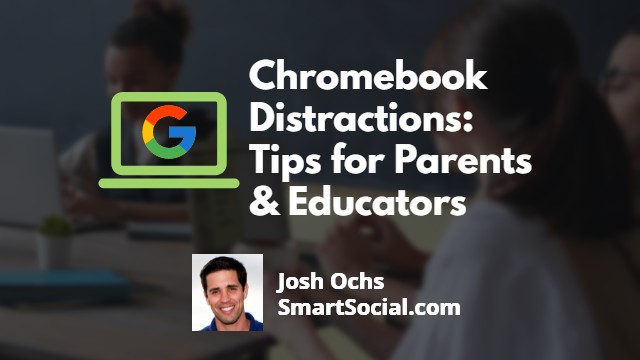Chromebook Distractions: Tips for Parents & Educators
Green Zone App
(Click here to learn more)
Dangerous Social media challenge
(Click here to learn more)
Red Zone App
(Click here to learn more)
Gray Zone App
(Click here to learn more)

Even before COVID-19 stay-at-home orders in early 2020, the use of Chromebooks in K-12 schools was increasing faster than new purchases of Apple or Microsoft-based desktop or laptop computers (EDWEEK MArket Brief).
Chromebooks have become the number-one device in K-12 education around the world because they are powerfully simple: opening a world of possibilities for every student and teacher, whether they’re at school, at home, or anywhere in between.
Moving students to online learning in 2020 forced many school districts and teachers to quickly shift their teaching methods to online delivery using the technology most available for students, either family or school provided. As students have returned to in-person learning in 2021, the Chromebooks are often still being used to aid in many teaching and learning strategies.
With these devices and wireless connections to the internet available at school, on buses, and at home, parents and educators have a daily battle to stay a step ahead of the distractions and help keep students focused on using the devices productively.
While many options exist to help educators, parents, and students learn how to navigate popular resources like Google Classroom, there is a lot of frustration with student behavior when they are entrusted with the internet and these devices.
Watch the 4 tips for parents and educators video
Understand what a Chromebook is (it is different than a laptop)
- Chromebooks are “Cloud based devices” (programs and information are stored and accessed from the internet rather than on the actual computer)
- They run on Google’s Chrome operating system (not Windows like a PC or macOS for Apples)
- They are manufactured by companies like HP, Dell, ASUS, Acer, and Lenovo
Hear what Google for Education teaches parents about Chromebooks:
Every Chromebook situation is different
- Schools use often use Google Workspace for Education (previously known as G Suite for Education)
- This allows the school’s technology administrator to create accounts for students and to set system-wide settings for any Chromebook they manage
- Some of our tips may not work for your student’s Chromebook based on their account’s settings
- As always, talk with your student’s teacher or your schools IT administrator for questions specific to your Google Workspace for Education settings
The most common Chromebook questions:
From parents:
My student came home with a Chromebook and now watches YouTube all the time. How can I block YouTube?
From educators:
Students are playing games and watching videos on their devices when they are supposed to be watching a presentation or doing another activity on their devices. How can I get them to focus on class?
Here are our four tips and resources to help parents and educators with these struggles. As always, the SmartSocial recommendations start with teaching students appropriate use of the technology. Then, we build with safety settings and monitoring possibilities.
Tip #1: Start with a device agreement
Our first recommendation is that parents and educators start conversations with students about the appropriate use of their Chromebooks (or any other device during school or homework time) with a device agreement.
(Click here to read “Why Every Family Needs a Social Media Agreement”. Many of the tips could work in a classroom setting between a teacher and students during class time.)
.jpeg)
- Create an agreement that students contribute to setting the rules and expectations for the use of their devices
- A student may have multiple agreements between different teachers and at home, but the more adults in their lives reinforcing the safety strategies, the better. Teachers can help students understand if rules are different at home than at school, the stricter rule is in place (Example: is social media allowed? If home rules say the student may not have social media, school rules should default to no as well for that student)
- Having written and clear expectations can help guide all future behavior and discussions needed when students stray from their work
- Students must learn from adults in their lives how to use technology and practice building positive habits with the internet, instead of learning habits from the technology that is trying to distract them
Points to consider when discussing the agreement with students:
- When is it appropriate to use the device?
- When is using the device not appropriate or allowed?
- If it is not an appropriate time for the device to be used, where should it be?
- What types of websites are appropriate for students to use and when? (And, what types of sites are never appropriate on a school-issued or personal device.)
- When is entertainment (streaming videos, non-educational games, music) appropriate on the device?
- Is social media ever allowed on the device (downloading apps and/or visiting social media websites)?
- When is it appropriate to watch non-assigned YouTube videos?
- Who is it appropriate to email or chat with on the Chromebook during school time or after school time?
For more ideas or questions to consider, visit the American Academy of Pediatrics Family Media Plan resource.
SmartSocial VIP families can take our “SmartPhone and Social Media Agreement Course" and get help in creating a fully custom agreement for your family.
Watch a preview of this course:
VIP Members: Click here to view the whole course.
Tip #2: Set up a Google Family Link

One parent told us: “Before I know what’s happening my 2nd-grade son has spent an hour watching YouTube videos because he watched the assigned video and then the next recommended videos kept playing. Do I have to sit next to him to turn off YouTube myself after his assignment?”
- It is important for parents and educators to keep an eye on what students have on their screens, but we know that’s not always possible. YouTube recommendations and “Up Next” videos are very addictive
- Get in the habit of reminding students every time they start using the device of the most important dos and don’ts from the agreement
There are some options for controlling what students do on their Chromebooks:
- Look into whether your school allows families to connect their school Google accounts to your personal Google Family Link
- Family Link allows parents to set limits for screen time and to allow or block certain apps
- The school’s Google Workspace administrator can create different accounts with different restrictions on the devices for students and teachers. (School Administrators, view Google’s Tips to Manage your organization’s YouTube settings here)
Watch the Google Chrome: Family Link video from the Google Jr. Training series
- Parents, consider talking with your student’s teachers and school administrators about what settings they chose for the school devices and have a conversation about how to work together to keep students safe online
Tip #3: Turn off the Wi-Fi, but first enable “Offline” mode in Google Drive
The offline mode allows students to create, open, and edit Google Docs, Sheets, and Slides files in a student’s Google Drive even when they are not connected to the internet. Any changes made in offline mode will save and sync next time the Chromebook is connected to the internet.
Watch the Google Junior Training Series: G suite: Offline Mode and Wi-Fi to see how to save these settings on your Chromebook:
At home, consider using a Wi-Fi system (like Google Wifi or eero) to easily control what devices have access to the internet. Consider using the Google Home or eero apps to set acceptable use times for specific devices to help control when devices and the internet are off-limits.
(Note: Some assignments may need internet access such as Scratch, Prodigy, iReady, etc. Talk with your student about their assignment and what resources they need to complete the work.)
Tip #4: Express your concerns to school administrators
- Work as a community to understand and make technology setting decisions
- Ask how your school upholds the Children’s Internet Protection Act (CIPA) with school-provided devices, whether they are used at school or out of school
- Ask your school what type of monitoring software they use and how they use it to keep students safe online
When all else fails...
Parents and educators must enforce that Chromebooks are turned off and put away when it is not an appropriate time to use them and that students do their work in a location that is visible to parents or teachers for monitoring. We always recommend turning electronics off at least one hour before bedtime and ALL devices are plugged in to charge in a central location at night away from bedrooms.
Additional resources
How to Use Screen Time Productively
Conclusion
Chromebooks can be a useful tool in learning for students today. However, the risks of screen time addiction and accessing undesired materials exist on any device connected to the internet. Parents and teachers can work together to create cohesive messages and support for students learning positive habits of internet use.
Protect your family and enter for a chance to win cool prizes
Become a member or log in to learn more on this topic
Protect your family and enter for a chance to win cool prizes

., start learning from this page to earn points!*
Hello, I'm Josh, the founder of SmartSocial.com.
Don't leave this page until you fill out our feedback form that will appear after you learn from the resources...
Here are some of the latest resources at SmartSocial.com
Become a Very Informed Parent (VIP) to get our social media suggestions in your email every Tuesday & Thursday.



Hello, I'm Josh, the founder of SmartSocial.com. Protect your family by taking my 1 minute quiz
This quiz will help you understand how safe your family is


Schools & Districts: Partner with us to protect your community online
Our remote presentations (and website) teach over a million parents and students each year how to be safe so they can shine online. We teach students how their accounts can be used to create a portfolio of positive accomplishments that impress colleges and employers.


Join Our Smart Social Podcast
each week on iTunes
With over 500 episodes, Josh Ochs interviews psychologists, therapists, counselors, teachers, and parents while showing you how to navigate social media to someday shine online.
Listen on:



.jpg)
.jpg)

.jpg)
.png)